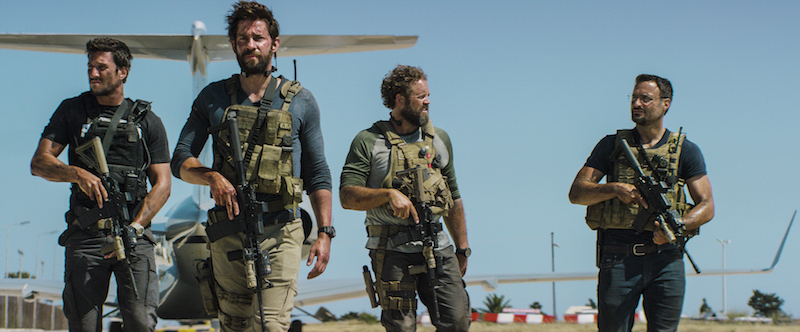
Last year, Clint Eastwood’s American Sniper, about a brawny, bearded gun-toting Navy SEAL played by Bradley Cooper, became a surprise smash hit and an unlikely pawn in the culture wars. (Critics claimed it dehumanized the Iraqi people and fetishized guns; fans said it showcased American exceptionalism, plus had lots of cool sniper scenes.)
Just a hunch here, but by director Michael Bay’s logic, if one brawny, bearded, gun-toting Navy SEAL is good, then six are even better. Enter 13 Hours: The Secret Soldiers of Benghazi, which makes American Sniper look positively pacifist by comparison.
Strangely enough, this is not an overtly political film, at least not in the traditional sense. Then Secretary of State Hillary Clinton’s name never comes up. Barack Obama is only briefly mentioned. The controversial phrase “Islamic extremist” is never uttered, although there is a scene that shows the Benghazi terrorists praying as their machine guns are stacked against a wall. (Subtle!) The politics here are the more simple kind, the sort that Ted Cruz (a big fan of this film, natch) suggests when he scornfully refers to “New York values” or that made Jack Nicholson’s “You can’t handle the truth!” speech from A Few Good Men such a favorite. Strong, macho, men of action = good. Ivy League educated, pointy-headed, East Coast intellectuals = bad.
As the film starts, ex Navy SEAL Jack Silva (John Krasinski) has just shown up in Benghazi, where there are two U.S. outposts: A secret CIA annex that Jack and five other former soldiers (mostly SEALS) are tasked with protecting and an under-armed compound where U.S. Ambassador Chris Stevens (Matt Letscher) is about arrive to perform a diplomatic mission, despite the State Department’s warnings against it. Bay certainly drives home his point that Libya (and Benghazi in particular) in a post Muammar Gaddafi world is chaos, where the vacuum in leadership has made room for warring terrorist factions, and the good guys are indistinguishable from the bad. It does, indeed, seem like hell out there.
The director of the CIA annex is played by David Costabile and if you thought Costabile’s role as ill-fated chemist Gale Boetticher in Breaking Bad was thankless, you ain’t seen nothing yet. His character’s name is “Bob” (no last name given) but it may as well be, “Punching Bag” or “Weak-Willed Liberal” or “Ineffectual Girly Man.” Bob, you see, doesn’t like the “Secret Soldiers” (really just government contractors paid to protect the annex), finds them loud—what with their constant shirtless weight-lifting and grunting—cocky, and unnecessary. There are numerous scenes in the film where Bob—who makes a point of boasting about his Ivy League bona fides—is proven wrong, shown cowering in fear of an imminent attack, or is told off by one of our stalwart heroes, just to elicit lusty audience cheers. (Conversely, the soldier are romanticized beyond belief: Not just brave and strong and skilled, but family men, who use iPads to Skype, moist-eyed, with their beautiful wives and children at home.)
It’s Bob, of course, who doesn’t want the Secret Soldiers to go help out when the ambassador’s compound is raided by terrorists, as it’s against protocol. But since the soldiers know they’re the ambassador’s only hope, they defy him. “You’re not giving orders any more!” says Tyrone “Rone” Woods (James Badge Dale), the cocky and charismatic leader of the team. “You’re taking them!” (*Loud, lusty cheers*)
The ineffectualness of the people in charge is an ongoing theme—and in that sense, the film’s most explicitly political aspect—as all the Americans stationed in Benghazi are essentially sitting ducks, caught wildly off guard by the attacks. What’s more, when the CIA calls for back-up in in the form of U.S. military aircraft, it never comes, except for one former SEAL stationed nearby who straps on a machine gun and bellows, “I need a bag full of money and a flight to Benghazi!”. They’re basically on their own out there.
As a straight-up action film, 13 Hours is crudely effective, particularly in that first heart-stopping raid on the ambassador’s home. Eventually, the film’s hyperactive hand-held camera, loudly pulsing music score, constant exchange of machine gun fire, and punishing length (2 hours and 24 minutes) grows tiresome. Also, as I mentioned, all the Secret Soldiers are bearded and buff so during one particularly chaotic scene—the terrorists have now moved from the ambassador’s home to the CIA annex—I literally had no idea who was who. (As a director, Bay has always preferred bombast to clarity.)
The actors do what they can with the thin material. Krasinski, best known as The Office’s dreamy prankster Jim Halpert, at first seems an odd choice to play Jack, but I get it: He has a reservoir of gentle melancholy that he’s able to tap into, making him the most relatable of our bulky soldiers. Dale is appealing as the renegade alpha male, and Pablo Schreiber provides something akin to comic relief as a fun-loving, gung-ho soldier nicknamed Tanto.
The film makes a few token concessions toward those who might accuse it of Islamophobia: A scene toward the end shows Benghazi women weeping over loved ones lost in the battles and a Benghazi translator working with CIA stays on to help even when he’s told it’s okay to go home. There’s even a mention of the fact that some Benghazi citizens took to the streets to mourn Ambassador Stevens. I personally think machines guns next to prayer services is the film’s more resonant image, but hey, at least Bay tried.
